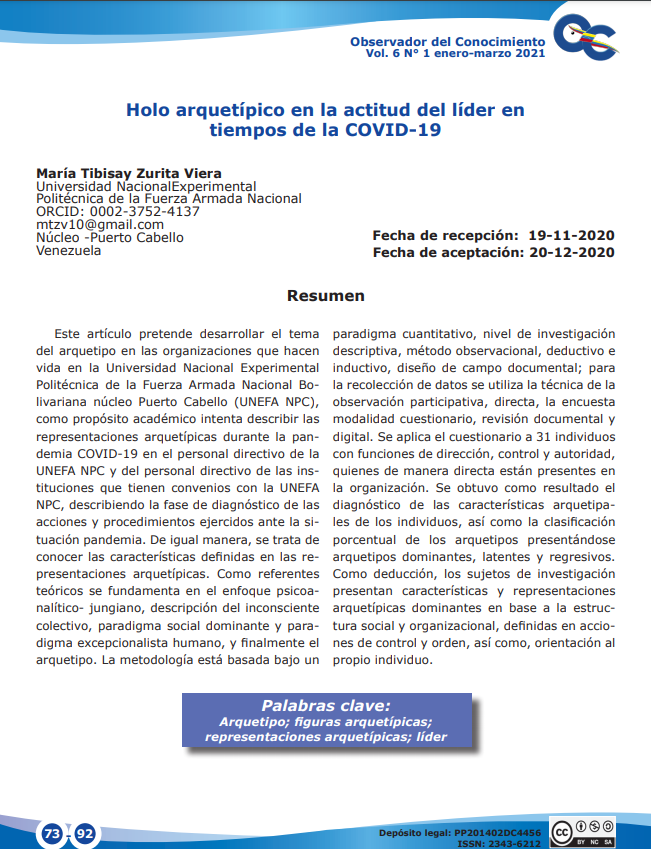Archetypal Holo in the attitude of the leader in COVID-19 times
Keywords:
Archetype; archetypal figures; archetypal representations; leaderAbstract
This article aims to develop the theme of the archetype in the organizations that make life in the Universidad Nacional Experimental Politécnica de la Fuerza Armada Núcleo Puerto Cabello (UNEFA NPC), as an academic purpose it tries to describe the archetypal representations during the COVID-9 pandemic in the management staff of the UNEFA NPC and the directive staff of the institutions that have agreements in UNEFA NPC, the diagnosis phase of the actions and procedure carried out in the face of the pandemic situation is described. In the same way, it is about knowing the characteristics defined in the archetypal representations. As theoretical referents, it is based on the psychoanalytic-Jungian approach, description of the collective unconscious, dominant social paradigm and human exceptionalist paradigm, and finally the archetype. The methodology is based on a quantitative paradigm, descriptive research level, observational, deductive and inductive method, documentary field design, for data collection the technique of direct participatory observation is used, the questionnaire modality survey, documentary review and digital. The questionnaire is applied to 31 individuals with functions of direction, control and authority, who are directly present in the organization, as a result the diagnosis of the archetypal characteristics of the individuals was obtained, as well as the percentage classification of the archetypes, and Dominant, latent and regressive archetypes are presented, as a deduction the research subjects present characteristics and dominant archetypal representations based on the social and organizational structure, defined in actions of control and order, as well as, orientation to the individual himself.
Downloads
References
AAMODT, M. (2010). Psicología industrial y organizacional. (6ª. Ed) Editorial Cencage Learning. México.
AJURIAGUERRA, R. y LOPEZ Z (1980). Manual de Psiquiatria. (2da reimpresión) Editorial Toray-Masson. Barcelona. Es
BRICEÑO y MELÉNDEZ (2020). Interpretando las miradas de los autores en la revista Observador del Conocimiento. Observador del Conocimiento. Vol. 5 Nº 3 septiembre - diciembre 2020 Entramados y tramas en Pandemia. Vol. 5 N° 1 en relación con la COVID-19. Fondo Editorial ediciones ONCTI.
CHALBAUD y MOGOLLÓN (2020). Potencialidades de los probióticos en el escenario de pandemia covid19.Potential of probiotics in the Covid-19 pandemic scenario. Observador del Conocimiento. Vol. 5 Nº 3 septiembre - diciembre 2020 Entramados y tramas en Pandemia. Fondo Editorial ediciones ONCTI.
CRUZ, J. E. (2004). Apuntes sobre una historia del paradigma dominante de la psicología social. Revista de Estudios Sociales, (18), 77-88. Retrieved February 09, 2021, from http://www.scielo.org.co/scielo.php?script=sci_arttext&pid=S0123885X2004000200009&lng=en&tlng=es.
DUNLAP, R. (1993). The Nature and Causes of Environmental Problems: A Socio-Ecological Perspective. Papel presentado a la International Conference on Environment and Development. Seul. Noviembre 1-3.
FREUD, S. (1900). La interpretación de los sueños. (1°ed). Deuticke. Leipzing. Alemania. Obras completas. Madrid Alianza Editorial.
GARCÍA, C. (2011). Diccionario temático de psicología. (1era Ed). Editorial Trillas. México.
Ginger Anne y Ginger Serge (1993). La gestalt una terapia de contacto. Distrito Federal. México. Editorial Manual Moderno.
GUTIÉRREZ, PUCHE y HERNÁNDEZ (2020). Estimación de casos de COVID-19 en países de Suramérica empleando modelos ARIMA (Autorregresivo Integrado de Promedio Móvil). Estimation of COVID-19 cases in South American countries using ARIMA models. Observador del Conocimiento. Vol. 5 Nº 3 septiembre - diciembre 2020 Entramados y tramas en Pandemia. Fondo Editorial ediciones ONCTI.
HERGENHAHN, B. R. (2011). Introducción a la Historia de la psicología. (1°ed). Editorial Cencage Learning. Distrito federal. México.
HILLEL y ALONSO (1995). Psicoterapia de grupo en la práctica clínica. (1era Ed). Editorial Manual Moderno Distrito Federal. México.
ISEA, R. (2020). Simulando la dinámica de transmisión de pacientes coinfectados con Covid-19 y Dengue. Simulating the transmission dynamics of patients coinfected with Covid-19 and Dengue. Observador del Conocimiento. Vol. 5 Nº 3 septiembre - diciembre 2020. Entramados y tramas en Pandemia. Fondo Editorial ediciones ONCTI.
JUNG, C. G. (1991,a). Arquetipos e inconsciente colectivo. (4. Ed). Editorial Paidós. Barcelona.
__________ (1997,b). El hombre y sus símbolos. (6º ed). Editorial Caralt. Barcelona.
LEWIN, C. (1997). Resolución de conflicto en el campo de la ciencia social. Asociación Americana de la Psicología. Washington. DC.
LIPTON, R. B. (2007). Prevalencia de la migraña, carga de morbilidad y necesidad de terapia preventiva. Neurología. Enero 30 (5): 343-9. doi 1. 1212/01. Wnl. 0000252808.9749.21. Centro de información de Biotecnología. Librería Nacional de medicina. Publemed.
MONTALVO J. y ANDRADE A. (2011). Conceptos básicos sobre la familia. Enfoque sistémico y modelo estructural. (1° ed). Editorial Trillas. México.
MORIN, E. (2020). Vivimos en un mundo incierto y trágico. Entrevista realizada por Le Monde, mayo,2000. Recuperado el 27-06-2020 en: https://www.milenio.com/cultura/laberinto/edgar-morin-pensamiento-complejo-tiempos-coronavirus.
OBERGOZO, J. (2003). Democracia, Participación, Ciudadanía. (1°ed). Editorial Federación Internacional Fe y Alegría, Isbn. 980-313-021-8. Caracas.
OBLITAS, L. (2008). Psicoterapias Contemporáneas. (1era Ed) Editorial Cencage Learning. México.
OVALLES, O. (2020). Los proyectos en Educación para el desarrollo endógeno después de la Pandemia. Reflexión en la acción. Observador del Conocimiento. Vol. 5 Nº 3 septiembre - diciembre 2020 Entramados y tramas en Pandemia. Fondo Editorial ediciones ONCTI. Fondo Editorial ediciones Oncti.
PALLELA y MARTINS (2012). Metodología de Investigación Cuantitativa. (4ª Ed) Fondo Editorial de la Universidad Pedagógica Experimental Libertador (FEDUPEL). Caracas, Venezuela.
Plan de la Patria 2019-2025. https://observatorioplanificacion.cepal.org/es/planes/plan-de-la-patria-2019-2025-de-venezuela.
PONT VIDAL, J. (2018). Autopoiesis en la teoría de sistemas de Niklas Luhmann: reflexiones para una reontologización. Athenea Digital. Revista de pensamiento e investigación social, [S.l.], v. 18, n. 3, p. e-1905, jul. 2018. ISSN 1578-8946. Disponible en: https://atheneadigital.net/article/view/v18-n3-pont. Fecha de acceso: 09 feb. 2021 doi:https://doi.org/10.5565/rev/athenea.1905.
RODRÍGUEZ y NÚÑEZ (2020). Rol de la COVID-19 en el desarrollo de la conciencia socialista. Observador del Conocimiento. Vol. 5 Nº 3 septiembre - diciembre 2020 Entramados y tramas en Pandemia. Fondo Editorial ediciones ONCTI.
ROMERO, G. (2020). Observador del Conocimiento. Vol. 5 Nº 3 septiembre-diciembre 2020 Entramados y Tramas en Pandemia. Fondo Editorial ediciones ONCTI.
TÓRTORA ARAVENA, H. (2010). Las Limitaciones a Los Derechos Fundamentales. Estudios constitucionales, 8(2), 167-200. https://dx.doi.org/10.4067/S0718-52002010000200007
VASCONI, T. (1980). Dependencia y Superestructura y otros ensayos. (3era Ed). Ediciones de la Biblioteca de la Universidad Central de Venezuela. Caracas.
WALLERSTEIN, I. (1997). El espaciotiempo como base del conocimiento análisis político. No. 32 SEP/DIC 1997. Instituto de Estudios Políticos y Relaciones Internacionales (IEPRI).

Downloads
Published
How to Cite
Issue
Section
License

This work is licensed under a Creative Commons Attribution-NoDerivatives 4.0 International License.







